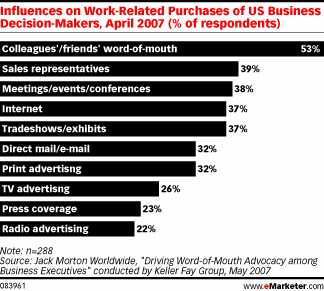
There are 3 types of opinion leadership, opinion leader, opinion seekers and opinion recipients. The progression by which individual (the opinion leader) informally influences the expenditure proceedings or thoughts of others who may be opinion seekers or opinion recipients.
Generally, Opinion leadership has a keen sense of knowledge and interest in the particular product or service area – perceived as having “expert power” and often receives information via non-personal sources – often reads magazines, special-interest publications or search the Internet for further information.
In fact, nowadays many well-recognized bloggers also act as an opinion leader. They write about product review, giving advice to their readers and answer reader comments or questions. As a consequence, I believe that blogger will become one of the significant gears in marketing and advertising.
The opinion leadership process is also known as word-of-mouth communications.Here is the sample research of influence on work-related purchase of Business Decision Makers, April 2007.

Base on the graph, we can clearly realized that word-of-mouth score the highest rates of influences among the entire channel. In most of the cases, words of mouth work best in restaurants.
Here is a video talk about Word of Mouth (WOM) Advertising from Microsoft
httpv://www.youtube.com/watch?v=R140FkPsMq4&
Personally, I’m totally agree that words of mouth work the best and it is totally free.
Key Differences Between Opinion Leaders and Surrogate Buyers
OPINION LEADER
1. Informal relationship with end users
2. Information exchange occurs in the context of a casual interaction
3. Homophilous (to a certain extent) to end users
4. Does not get paid for advice
5. Usually socially more active than end users
6. Accountability limited regarding the outcome of advice
7. As accountability limited, rigor in search and screening of alternatives low
8. Likely to have used the product personally
9. More than one can be consulted before making a final decision
10. Same person can be an opinion leader for a variety of related product categories
Key Differences Between Opinion Leaders and Surrogate Buyers
SURROGATE BUYER
1. Formal relationship; occupation-related status
2. Information exchange in the form of formal instructions/advice
3. Heterophilus to end users (that is, is the source of power)
4. Usually hired, therefore gets paid
5. Not necessarily socially more active than end-users
6. High level of accountability
7. Search and screening of alternatives more rigorous
8. May not have used the product for personal consumption
9. Second opinion taken on rare occasions
10. Usually specializes for a specific product/service category
image